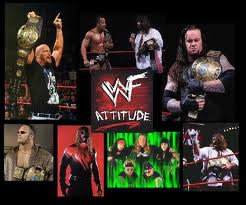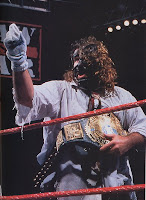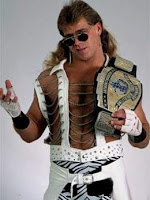What was once considered an unlikely dream by many has finally come to fruition. For the first time in his wrestling career which has extended over 25 years, Sting has stepped foot in a WWE ring.
At WWE's recent Survivor Series pay-per-view, Sting emerged in the midst of the Team Cena vs. Team Authority Survivor Series match. At the time, Dolph Ziggler and Seth Rollins were the remaining two wrestlers in the match. The stipulation: If Team Authority wins, the members of Team Cena would be fired. If Team Cena wins, Triple H and Stephanie McMahon would lose their roles in power of the WWE. With multiple referees wiped out, Triple H did his part to save his job, landing a pedigree on Ziggler and putting Rollins over him for a pin. Cue the crow music.
As the music played, and visuals of Sting played on the 'tron, a plethora of reactions ensued from the crowd. Shock and excitement on the part of those who had always wished for this moment, confusion by the skeptics who were unsure if this was really happening, and silence on the part of the children who know little to none about Sting's story.
Upon entering the ring, and wiping out the referee who has been knowing for showing bias for The Authority, an intense stare down took place between Sting and Triple H. When the latter attempted to strike, the Stinger retaliated, which lead to one of his signature moves, The Scorpion Death Drop. He would then drag the knocked down Ziggler over Rollins, ensuring a win for Team Cena.

For those unfamiliar with his story, Sting was long considered "The Franchise" of the now defunct WCW (bought out be the WWE in 2001). He was their major player from the time WCW seceded from the National Wrestling in 1991 and became it's own entity, and remained with the company until it's demise in 2001. Over the course of this period, many wrestlers jumped ship from WCW to WWE (then known as the WWF), and vice versa. Some of these wrestlers would even go from one promotion to the other, only to eventually come back to the promotion they were with in the first place. But while nearly all the big names in WCW during this time would jump ship to the WWF at some point (Ric Flair, Lex Luger, Vader, The Big Show, etc), Sting remained in a WCW ring.
Earlier in his career, Sting was known for his colorful face paint and ring attire, and bleached blonde spiked hair. In early 1996, he began to keep his natural hair color and had it slightly longer, while still wearing colorful face paint. It was during this time that the NWO was founded, featuring Hulk Hogan, Kevin Nash, and Scott Hall. Over the course of the ensuing battle against the NWO, Sting would stand up for WCW for several months. Eventually, fellow wrestlers would question Sting's loyalty to WCW, and were unsure if Sting himself might join the NWO. Feeling hurt by these accusations, Sting announced that he was a "free agent", and took a hiatus from being seen on-screen during WCW television.

As time passed, Sting would eventually make his return to television. With longer black hair, white and black face paint, and wearing a trench coat, Sting's appearance took the form of his present look. Although he'd occasional appear on WCW Nitro, Sting did not actively wrestle, and remained silent for over a year. While he primarily could be seen in the rafters of the building, Sting would occasionally drop in to confront the NWO, and save WCW wrestlers from their attacks. Eventually, Sting would make his in-ring return to confront Hulk Hogan, and the two wrestled for Hogan's WCW Heavyweight Title at Starrcade 1997.
Years later, when Vince McMahon purchased WCW in 2001, many WCW wrestlers would soon reach contracts with the WWE. However, Sting was not one of them. On the very last episode of WCW Nitro, Sting defeated Ric Flair to close the show, and the two hugged after the match. While Vince McMahon offered Sting a contract, he would decide to turn it down. Ultimately, Sting didn't trust that McMahon would use him properly, and cited other WCW wrestlers as examples of being treated poorly when coming to WWE at this time.
Sting would go on to wrestle for TNA for the better part of a decade. Regardless of being a mainstay in another promotion during recent years, there's been no shortage of rumors of Sting coming to the WWE, particularly around WrestleMania. Often times, this might involve supposed "sources" stating Sting being in talks with Vince McMahon, or fan made videos teasing a Sting return. The rumors are no more. But now that Sting has finally made his arrival into the WWE, more questions have arisen. Why did he want to take down Team Authority at Survivor Series when he has never had to deal with them first hand? Who and when will he wrestle?
While the first question remains to be answered, it might shed light on who his first WWE opponent will be. Triple H still remains a big name in the wrestling, and has star power, which is something WWE is currently lacking when looking at the rest of the current roster. It seems unlikely that Sting will be a week to week wrestler, and instead WWE officials will want to use him for marquee pay-per-view matches. But while Triple H isn't exsctly a slouch within the wrestling world, it might not be the match that people ultimately want, particularly when considering another popular scenario.

Dream matches are a common discussion among wrestling fans, some of them pitting more recent wrestlers who never seemed to cross paths, while others involving wrestlers who might have rose to fame many decades apart. How would Shawn Michaels vs. Randy Savage have been if they were able to wrestle against each other in their primes in fantasy land? What about Hulk Hogan vs. Steve Austin? Well, with Sting's arrival, there's one opponent who many have wanted to see him face for a very long time. The Undertaker.
The Undertaker has primarily been to WWE what Sting was to WCW. For over two decades, The Undertaker has been a staple for the WWE, and always considered amongst the who's who of WWE wrestlers. When thinking of a WWE Mount Rushmore, 'Taker has as good of case as anyone, whether it be Hulk Hogan, Steve Austin, Shawn Michaels, you name it. The Undertaker, at times referred to as "The Lord of Darkness", "The Phenom", and "The Grim Reaper", has spent the majority of his tenure using his supernatural powers and mind games to get inside the heads of opponents, while at times making children scared in the process.
While Sting isn't overtly similar to The Undertaker's character, especially as Sting's career has gone on, it's similar enough to draw comparisons between the two. In fact, comparisons have been named between the two since the inception of Sting's crow character in WCW during 1996, which first sparked fans to develop interest in a scenario in which the two were to face each other. Between the all black outfits, the darkness, minimal dialog (Particuarly during The Undertaker's early years, and Sting's first year with his crow character), and use of mind games, the similarities are definitely there.
When looking at the here and now, most speculation still sides with the notion that Sting's first WWE opponent will be Triple H. But with Royal Rumble, one of WWE's major pay-pay-views, in addition to WrestleMania coming shortly after, that allows for the possibility of Sting having two marquee matchups. Should he face Triple H, it remains to be seen as to whether the WWE would want to save this for WrestleMania, or use it as a way to gain some buys at the Royal Rumble. In the case of a possible match with The Undertaker, 'Taker's health may become the biggest hurdle, as he has broken down physically. Granted he is able to go for WrestleMania, a match with Sting will be the one that fans will clamor for. While it might seem that this match should have happened ten years ago, this is one of those situations where it's better late then never. Regardless of the uncertainty, it will interesting to see how Sting's involvement will play out. And more importantly, if there's one thing that's sure about Sting, it's that nothing's for sure...





















